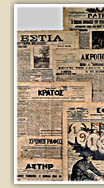|
|
 |
 |
 |
 |
 |
 |
 |
 |
 |
 |
|
The circulation of newspapers in Greece at the beginning of the twentieth century rose
to remarkably high figures. The overwhelming majority were concerned with
politics, while many were the official instruments of various parties.
|

Throughout this period the Press played an important role and in moments of crisis
contributed to the formation of the political and social climate.
In the period 1905-9 the most important newspapers turned against
the old parties and asked for an overall transformation of the political life. Among
the most militant journalists, Vlassis Gavriilidis, wrote fervent articles
in the newspaper Acropolis against Old Party politicians and in favour
of the need for reforms in the direction of a 'peaceful revolution'.
Before, during and after the military coup of Goudi the press served to the best of its ability the coup and its objectives. Hronos was the newspaper of the coup ringleaders; it disseminated their views systematically .
At the same time, the majority of other newspapers supported
the demands of the Military League to the extent that they raised suspicions
as to alleged pressures exerted by the coup ringleaders on journalists.
In the period of the Balkan Wars, the Athenian press was exclusively preoccupied
with the military operations and decisively contributed to the creation of
an atmosphere of national unaninimity and elation. The Crown Prince Constantine was raised to the
status of an inspired victorious army commander and leader of the nation, and thus the dynasty, although
given a blow by the defeat of 1897, was restored as a symbol of unity and national
renaissance.
|
 |

In the period of the National Scism, the Press took sides supporting the one or
the other political party and its leaders with passion. The political division
formed a climate of polarization that influenced the newspapers as well.
Their party alignments contributed even more to political divisions, instilling fanatisicm into their readers.
Harsh attacks were launched against political opponents. The leading figures
of the two political blocs were eulogised or vilified.
The polarization was thus chanelled, by the Press, throughout Greek society.
In the period before the elections of 1920, the Press' important role became apparent once again. Absolutely aligned
with and dependent on individual parties, the Press reflected and reproduced the division
of the political camps of the country. The aim of the journalists was not
to confirm the established views of their readers but to reinforce them with additional arguments. The cult of the personality
and fanaticism characterized the articles, which presented Venizelos as a patriot
or tyrant and Constantine as traitor or symbol of peace and order, respectively.
|
 |
 |
|
